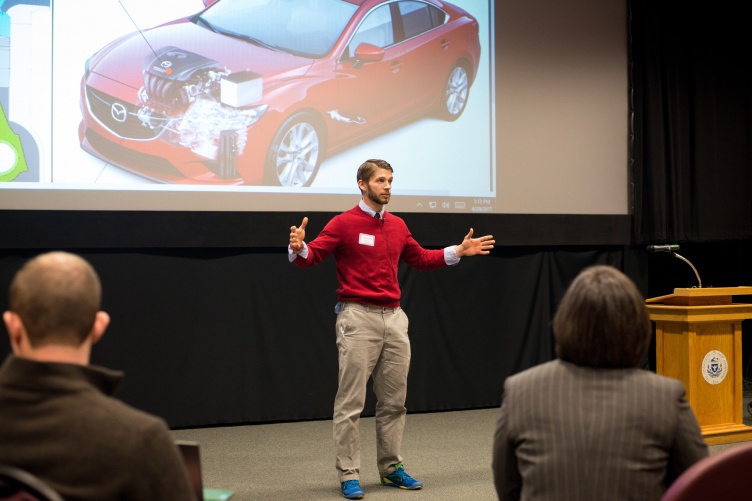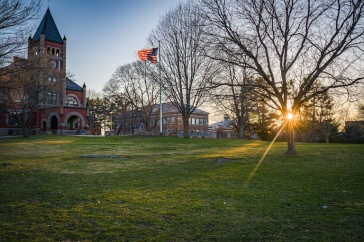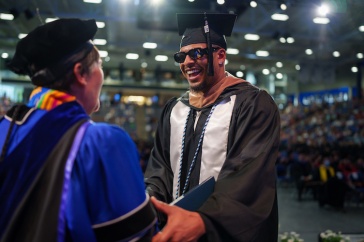
Drummond Biles presenting in the 2017 3MT competition
Drummond Biles and Meagan Wengrove are not only recent PhD graduates from UNH, but they are also soon to be married. Biles, PhD mechanical engineering, serves as a postdoctoral researcher at Sandia National Laboratories. Wengrove, PhD ocean engineering, serves as assistant professor at Oregon State University.
Looking back, both Biles and Wengrove consider their participation in the 2017 3 Minute Thesis (3MT) Challenge an integral part of their graduate school experience.
The 3MT is a competition in which graduate students describe their research in three minutes or less to a general audience using only one static PowerPoint slide. In 2017, Biles was awarded first place, and Wengrove took second.

This year, the competition is completely virtual. The first rounds occur Tuesday, March 30, and Wednesday, March 31, on Zoom. The top six from each day will move onto the final round scheduled for Wednesday, April 21, on Zoom. A panel of judges will decide the winners, who will receive cash prizes.
To offer advice and perspective about the 3MT to current students, we asked the couple to weigh in on their experience doing the 3MT in light of their current roles.
What would you say to current students considering (or maybe not considering) doing the 3MT?
Wengrove: It's a lot of fun, and an interesting process to present something you have been thinking about so deeply to a broad audience. It helps you figure out what is really important about your research. Why should people care? It may seem difficult, and it is, but it's also rewarding.
Biles: Just do it! Everyone can gain something. Why do research if you don’t want to communicate it? It seems obvious to some extent. It can be painful, but it just makes sense to develop the elevator pitch. You may not have an award-winning 3MT, but you’ll still gain from it. Even if you can’t get someone off the street to read your thesis, you can still gain from it.
What do you think is the value of sharing work in progress?
Wengrove: If folks have a story they can tell, which is true at almost any stage, then they should tell it! When I did my 3MT I was 1 year out from defending, so I had a good story. But Drummond, who took first place (I took second) was 3 years away. His story was much less developed at that time, but he could still tell people why it matters. It's not as much about the best data, but the way you present why the topic matters.
What was your presentation process like?
Wengrove: I made a figure that I felt could represent all the different pieces of my problem in an understandable way to the general knowledge group. Then I wrote a script about it so that I could make sure I stayed under 3 minutes. I didn't memorize the script, but it helped me stay on track.
Biles: I wrote a script and had to memorize it, which is not my style, and was super challenging. The fact that every word mattered—how many could I say in 3 minutes? I would read out loud for 3 minutes at an average reading pace and then wrote a script—3 paragraphs each with a certain number of words so that I knew my cadence. The picture also did a lot of work—I couldn’t do all of that! I knew I had to give some type of a graphical representation so that people could follow along. It’s just easier if you could just show versus tell.
What other experiences at UNH shaped your current life as a researcher?
Biles: If you’re lucky in grad school, you get to teach students as well. Having a teaching background helped structure how to present the material to connect with whoever is sitting in the seats. In addition to teaching, being a part of the Graduate Student Senate (GSS) helped as well because I was able to engage with a broader audience. Unfortunately as a grad student, you have a lot of work to do. I mostly engaged with a lot of engineers. The GSS was an opportunity to engage with other people of other disciplines.
What does research communication look like for you in your current role?
Biles: We had someone from Scientific American come in to interview and write an article about us. That was interesting, especially with how much research and writing had come before it. It was really nice to have this clean document to engage with people—the first thing I did was send it to my mother! And it made me think of the 3MT because they needed pictures, so we spent about a week in the lab working to get this one picture—I kept thinking, this would be my 3MT slide!
Wengrove: I have 2 projects right now that were formulated with a stakeholder, to address questions that they don't know the answers to because research needs to be done. I also volunteer at the Oregon Museum of Science and Industry to share my research to the public.
Check out Biles's and Wengrove's 3MT presentations below, and view our 3MT workshop and competition schedule here.
-
Written By:
Lily Greenberg '21G | Grad School
















































